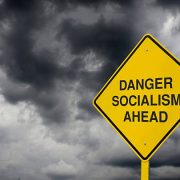The debate about the NFL Players’ protests during the playing of the national anthem at the beginning of their games continues. Is it appropriate for them to make an act of protest, during the implementation of their contractual obligations to their employer, against social conditions they perceive as being unacceptable to them?
Emergence.
The emergence of this conflict between players and team owners, and players and some part of their fan base, and between players and media commentators and politicians, can be traced to a single spontaneous act. At an August 14, 2017 NFL pre-season game, Colin Kaepernick, a player, sat instead of standing during the playing of the national anthem. He explained why: he wanted to bring attention to people who, according to him, are being oppressed.
As we might expect in spontaneously ordered activities, the protest expanded and morphed. More players joined in, and the act became “taking a knee” during the anthem, in addition to sitting. It also generated controversy: is the protest activity appropriate?
Taxis And Kosmos.
If the NFL players had read their Hayek, they might realize that they are confusing two forms of social order, and doing so in a way that is inappropriate if we want to preserve our society.
Hayek, a philosopher who probably never attended an NFL game (although that fact might be in the realm of the unknowable) had a strong point of view about this issue. He distinguished between two kinds of order: taxis and kosmos. He used the term taxis to refer to concrete order, deliberately designed and resting on hierarchical structures of commands and obedience. Kosmos, on the other hand, is spontaneous, self-generating order based on abstract, unspoken relations and expectations of others’ behavior, without specific hierarchical rules or organizational purpose.
NFL Players Work In Taxis.
The NFL players work, voluntarily, in a taxis. They each signed a contract, which binds them to the specific organizational purpose of the NFL to provide entertainment to consumers, preserve and grow the NFL brand, and generate a profit for their team owners. The owners, Hayek points out, “will normally prefer a larger return from their efforts to a smaller one”, and have the power to tell players “what they ought or ought not to do” to abide by this rule. These kinds of taxis organizations exist throughout the economy and have proven themselves to be beneficial to society by generating popular products and services, innovation, and economic growth. They are necessary and beneficial.
NFL Players Live In Kosmos.
Taxis organizations exist within kosmos systems that are self-organizing and self-generating. Society is an example of such a system – it’s a spontaneous order that emerges, Hayek tells us, “from the individual elements adapting themselves to circumstances which directly affect only some of them”. Spontaneous orders can’t be “deliberately arranged” because we do not have “power over the details of such an order”. There are no owners in a spontaneous order system, and no-one can dictate specific rules to individuals in such an order.
The protesting NFL players are adapting themselves to circumstances they subjectively observe in their kosmos. They feel that some individuals in society are oppressed by taxis organizations, such as police and the courts. It is their subjective individual right to express an opinion about how they feel and to offer their expressions to others, so that those others can consider their own opinion and their own expression.
Crossing The Line.
However, by translating their kosmos perceptions into behavior in the taxis without the owners’ approval, the players are crossing a line that disrupts order. It is necessary for social order that the kosmos and the taxis co-exist but do not conflict. We cannot “combine them in any manner we like”.
Rules within an organization “must be rules for the performance of assigned tasks”. The place of each individual in a fixed structure is determined by command. “The rules each individual must obey depend on the place which he has been assigned and on the particular ends which have been indicating for him by the commanding authority.”
By contrast, “the rules governing a spontaneous order must be independent of purpose…and their application (by individuals) will be independent of any common purpose.” The players want to protest, which is an abstract idea with no specific purpose. That’s OK. They can do so as individuals on social media and in their life outside their contractual obligations to their employer. The owners have specific purposes to which the players have bound themselves in their NFL life, and they are contractually obligated. If they prefer to pursue other abstract ideas, they must do so outside of their contractual restrictions.
It’s when we confuse taxis and kosmos that we cause dangerous disorder.
All quotes are from F. A. Hayek; Law, Legislation and Liberty, Vol 1.
Photo by Sandro Schuh on Unsplash













